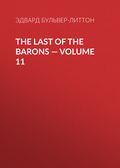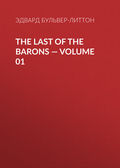
Эдвард Бульвер-Литтон
Devereux — Volume 03
Was St. John right? I believe that in most instances he was; and perhaps the custom was not continued in my case long enough for me to refute the maxim. But as yet, the very gloss upon the god's wings was fresh as on the first day when I had acknowledged his power. Still was Isora to me the light and the music of existence! still did my heart thrill and leap within me when her silver and fond voice made the air a blessing! Still would I hang over her, when her beautiful features lay hushed in sleep, and watch the varying hues of her cheek; and fancy, while she slept, that in each low, sweet breath that my lips drew from hers, was a whisper of tenderness and endearment! Still when I was absent from her, my soul seemed to mourn a separation from its better and dearer part, and the joyous senses of existence saddened and shrank into a single want! Still was her presence to my heart as a breathing atmosphere of poesy which circled and tinted all human things; still was my being filled with that delicious and vague melancholy which the very excess of rapture alone produces,—the knowledge we dare not breathe to ourselves that the treasure in which our heart is stored is not above the casualties of fate. The sigh that mingles with the kiss; the tear that glistens in the impassioned and yearning gaze; the deep tide in our spirit, over which the moon and the stars have power; the chain of harmony within the thought which has a mysterious link with all that is fair and pure and bright in Nature, knitting as it were loveliness with love!—all this, all that I cannot express; all that to the young for whom the real world has had few spells, and the world of visions has been a home, who love at last and for the first time,—all that to them are known were still mine.
In truth, Isora was one well calculated to sustain and to rivet romance. The cast of her beauty was so dreamlike, and yet so varying: her temper was so little mingled with the common characteristics of woman; it had so little of caprice, so little of vanity, so utter an absence of all jealous and all angry feeling; it was so made up of tenderness and devotion, and yet so imaginative and fairy-like in its fondness,—that it was difficult to bear only the sentiments of earth for one who had so little of earth's clay. She was more like the women whom one imagines are the creations of poetry, and yet of whom no poetry, save that of Shakspeare, reminds us; and to this day, when I go into the world, I never see aught of our own kind which recalls her, or even one of her features, to my memory. But when I am alone with Nature, methinks a sweet sound or a new-born flower has something of familiar power over those stored and deep impressions which do make her image, and it brings her more vividly before my eyes than any shape or face of her own sex, however beautiful it may be.
There was also another trait in her character which, though arising in her weakness, not her virtues, yet perpetuated the more dreamlike and imaginary qualities of our passion: this was a melancholy superstition, developing itself in forebodings and omens which interested, because they were steeped at once in the poetry and in the deep sincerity of her nature. She was impressed with a strong and uncontrollable feeling that her fate was predestined to a dark course and an early end; and she drew from all things around her something to feed the pensive character of her thoughts. The stillness of noon; the holy and eloquent repose of twilight, its rosy sky and its soft air, its shadows and its dews,—had equally for her heart a whisper and a spell. The wan stars, where, from the eldest time, man has shaped out a chart of the undiscoverable future; the mysterious moon, to which the great ocean ministers from its untrodden shrines; the winds, which traverse the vast air, pilgrims from an eternal home to an unpenetrated bourne; the illimitable heavens, on which none ever gazed without a vague craving for something that the earth cannot give, and a vague sense of a former existence in which that something was enjoyed; the holy night; that solemn and circling sleep, which seems, in its repose, to image our death, and in its living worlds to shadow forth the immortal realms which only through that death we can survey,—all had, for the deep heart of Isora, a language of omen and of doom. Often would we wander alone, and for hours together, by the quiet and wild woods and streams that surrounded her retreat, and which we both loved so well; and often, when the night closed over us, with my arm around her, and our lips so near that our atmosphere was our mutual breath, would she utter, in that voice which "made the soul plant itself in the ears," the predictions which had nursed themselves at her heart.
I remember one evening, in especial. The rich twilight had gathered over us, and we sat by a slender and soft rivulet, overshadowed by some stunted yet aged trees. We had both, before she spoke, been silent for several minutes; and only when, at rare intervals, the birds sent from the copse that backed us a solitary and vesper note of music, was the stillness around us broken. Before us, on the opposite bank of the stream, lay a valley, in which shadow and wood concealed all trace of man's dwellings, save at one far spot, where, from a single hut, rose a curling and thin vapour, like a spirit released from earth, and losing gradually its earthier particles, as it blends itself with the loftier atmosphere of heaven.
It was then that Isora, clinging closer to me, whispered her forebodings of death. "You will remember," said she, smiling faintly, "you will remember me, in the lofty and bright career which yet awaits you; and I scarcely know whether I would not sooner have that memory—free as it will be from all recollection of my failings and faults, and all that I have cost you, than incur the chance of your future coldness or decrease of love."
And when Isora turned, and saw that the tears stood in my eyes, she kissed them away, and said, after a pause,—
"It matters not, my own guardian angel, what becomes of me: and now that I am near you, it is wicked to let my folly cost you a single pang. But why should you grieve at my forebodings? there is nothing painful or harsh in them to me, and I interpret them thus: 'If my life passes away before the common date, perhaps it will be a sacrifice to yours.' And it will, Morton—it will. The love I bear to you I can but feebly express now; all of us wish to prove our feelings, and I would give one proof of mine for you. It seems to me that I was made only for one purpose—to love you; and I would fain hope that my death may be some sort of sacrifice to you—some token of the ruling passion and the whole object of my life."
As Isora said this, the light of the moon, which had just risen, shone full upon her cheek, flushed as it was with a deeper tint than it usually wore; and in her eye—her features—her forehead—the lofty nature of her love seemed to have stamped the divine expression of itself.
Have I lingered too long on these passages of life? They draw near to a close, and a more adventurous and stirring period of manhood will succeed. Ah, little could they, who in after years beheld in me but the careless yet stern soldier—the wily and callous diplomatist—the companion alternately so light and so moodily reserved—little could they tell how soft, and weak, and doting my heart was once!
CHAPTER VI
AN UNEXPECTED MEETING.—CONJECTURE AND ANTICIPATION
THE day for the public solemnization of our marriage was at length appointed. In fact, the plan for the future that appeared to me most promising was to proffer my services to some foreign court, and that of Russia held out to me the greatest temptation. I was therefore anxious, as soon as possible, to conclude the rite of a second or public nuptials, and I purposed leaving the country within a week afterwards. My little lawyer assured me that my suit would go on quite as well in my absence, and whenever my presence was necessary he would be sure to inform me of it. I did not doubt him in the least—it is a charming thing to have confidence in one's man of business.
Of Montreuil I now saw nothing; but I accidentally heard that he was on a visit to Gerald, and that the latter had already made the old walls ring with premature hospitality. As for Aubrey, I was in perfect ignorance of his movements; and the unsatisfactory shortness of his last letter, and the wild expressions so breathing of fanaticism in the postscript, had given me much anxiety and alarm on his account. I longed above all to see him, to talk with him over old times and our future plans, and to learn whether no new bias could be given to a temperament which seemed to lean so strongly towards a self-punishing superstition. It was about a week before the day fixed for my public nuptials that I received at last from him the following letter:—
MY DEAREST BROTHER,—I have been long absent from home,—absent on affairs on which we will talk hereafter. I have not forgotten you, though I have been silent, and the news of my poor uncle's death has shocked me greatly. On my arrival here I learned your disappointment and your recourse to law. I am not so much surprised, though I am as much grieved as yourself, for I will tell you now what seemed to me unimportant before. On receiving your letter, requesting consent to your designed marriage, my uncle seemed greatly displeased as well as vexed, and afterwards he heard much that displeased him more; from what quarter came his news I know not, and he only spoke of it in innuendoes and angry insinuations. As far as I was able I endeavoured to learn his meaning, but could not, and to my praises of you I thought latterly he seemed to lend but a cold ear; he told me at last, when I was about to leave him, that you had acted ungratefully to him, and that he should alter his will. I scarcely thought of this speech at the time, or rather I considered it as the threat of a momentary anger. Possibly, however, it was the prelude to that disposition of property which has so wounded you: I observe, too, that the will bears date about that period. I mention this fact to you; you can draw from it what inference you will: but I do solemnly believe that Gerald is innocent of any fraud towards you.
I am all anxiety to hear whether your love continues. I beseech you to write to me instantly and inform me on that head as on all others. We shall meet soon.
Your ever affectionate Brother,
AUBREY DEVEREUX.
There was something in this letter that vexed and displeased me: I thought it breathed a tone of unkindness and indifference, which my present circumstances rendered peculiarly inexcusable. So far, therefore, from answering it immediately, I resolved not to reply to it till after the solemnization of my marriage. The anecdote of my uncle startled me a little when I coupled it with the words my uncle had used towards myself on his death-bed; namely, in hinting that he had heard some things unfavourable to Isora, unnecessary then to repeat; but still if my uncle had altered his intentions towards me, would he not have mentioned the change and its reasons? Would he have written to me with such kindness, or received me with such affection? I could not believe that he would; and my opinions of the fraud and the perpetrator were not a whit changed by Aubrey's epistle. It was clear, however, that he had joined the party against me; and as my love for him was exceedingly great, I was much wounded by the idea.
"All leave me," said I, "upon this reverse,—all but Isora!" and I thought with renewed satisfaction on the step which was about to insure to her a secure home and an honourable station. My fears lest Isora should again be molested by her persecutor were now pretty well at rest; having no doubt in my own mind as to that persecutor's identity, I imagined that in his new acquisition of wealth and pomp, a boyish and unreturned love would easily be relinquished; and that, perhaps, he would scarcely regret my obtaining the prize himself had sought for, when in my altered fortunes it would be followed by such worldly depreciation. In short, I looked upon him as possessing a characteristic common to most bad men, who are never so influenced by love as they are by hatred; and imagined, therefore, that if he had lost the object of the love, he could console himself by exulting over any decline of prosperity in the object of the hate.
As the appointed day drew near, Isora's despondency seemed to vanish, and she listened, with her usual eagerness in whatever interested me, to my Continental schemes of enterprise. I resolved that our second wedding, though public, should be modest and unostentatious, suitable rather to our fortunes than our birth. St. John, and a few old friends of the family, constituted all the party I invited, and I requested them to keep my marriage secret until the very day for celebrating it arrived. I did this from a desire of avoiding compliments intended as sarcasms, and visits rather of curiosity than friendship. On flew the days, and it was now the one preceding my wedding. I was dressing to go out upon a matter of business connected with the ceremony, and I then, as I received my hat from Desmarais, for the first time thought it requisite to acquaint that accomplished gentleman with the rite of the morrow. Too well bred was Monsieur Desmarais to testify any other sentiment than pleasure at the news; and he received my orders and directions for the next day with more than the graceful urbanity which made one always feel quite honoured by his attentions.
"And how goes on the philosophy?" said I: "faith, since I am about to be married, I shall be likely to require its consolations."
"Indeed, Monsieur," answered Desmarais, with that expression of self-conceit which was so curiously interwoven with the obsequiousness of his address, "indeed, Monsieur, I have been so occupied of late in preparing a little powder very essential to dress, that I have not had time for any graver, though not perhaps more important, avocations."
"Powder—and what is it?"
"Will Monsieur condescend to notice its effect?" answered Desmarais, producing a pair of gloves which were tinted of the most delicate flesh-colour; the colouring was so nice, that when the gloves were on, it would have been scarcely possible, at any distance, to distinguish them from the naked flesh.
"'Tis a rare invention," said I.
"Monsieur is very good, but I flatter myself it is so," rejoined Desmarais; and he forthwith ran on far more earnestly on the merits of his powder than I had ever heard him descant on the beauties of Fatalism. I cut him short in the midst of his harangue: too much eloquence in any line is displeasing in one's dependant.
I had just concluded my business abroad, and was returning homeward with downcast eyes and in a very abstracted mood, when I was suddenly startled by a loud voice that exclaimed in a tone of surprise: "What!—Count Devereux,—how fortunate!"
I looked up, and saw a little dark man, shabbily dressed; his face did not seem unfamiliar to me, but I could not at first remember where I had seen it: my look, I suppose, testified my want of memory, for he said, with a low bow,—
"You have forgotten me, Count, and I don't wonder at it; so please you, I am the person who once brought you a letter from France to Devereux Court."
At this, I recognized the bearer of that epistle which had embroiled me with the Abbe Montreuil. I was too glad of the meeting to show any coolness in my reception of the gentleman, and to speak candidly, I never saw a gentleman less troubled with /mauvaise honte/.
"Sir!" said he, lowering his voice to a whisper, "it is most fortunate that I should thus have met you; I only came to town this morning, and for the sole purpose of seeking you out. I am charged with a packet, which I believe will be of the greatest importance to your interests. But," he added, looking round, "the streets are no proper place for my communication; /parbleu/, there are those about who hear whispers through stone walls: suffer me to call upon you to-morrow."
"To-morrow! it is a day of great business with me, but I can possibly spare you a few moments, if that will suffice; or, on the day after, your own pleasure may be the sole limit of our interview."
"/Parbleu/, Monsieur, you are very obliging,—very; but I will tell you in one word who I am and what is my business. My name is Marie Oswald: I was born in France, and I am the half-brother of that Oswald who drew up your uncle's will."
"Good Heavens!" I exclaimed; "is it possible that you know anything of that affair?"
"Hush—yes, all! my poor brother is just dead; and, in a word, I am charged with a packet given me by him on his death-bed. Now, will you see me if I bring it to-morrow?"
"Certainly; can I not see you to-night?"
"To-night?—No, not well; /parbleu/! I want a little consideration as to the reward due to me for my eminent services to your lordship. No: let it be to-morrow."
"Well! at what hour? I fear it must be in the evening."
"Seven, /s'il vous plait/, Monsieur."
"Enough! be it so."
And Mr. Marie Oswald, who seemed, during the whole of this short conference, to have been under some great apprehension of being seen or overheard, bowed, and vanished in an instant, leaving my mind in a most motley state of incoherent, unsatisfactory, yet sanguine conjecture.







